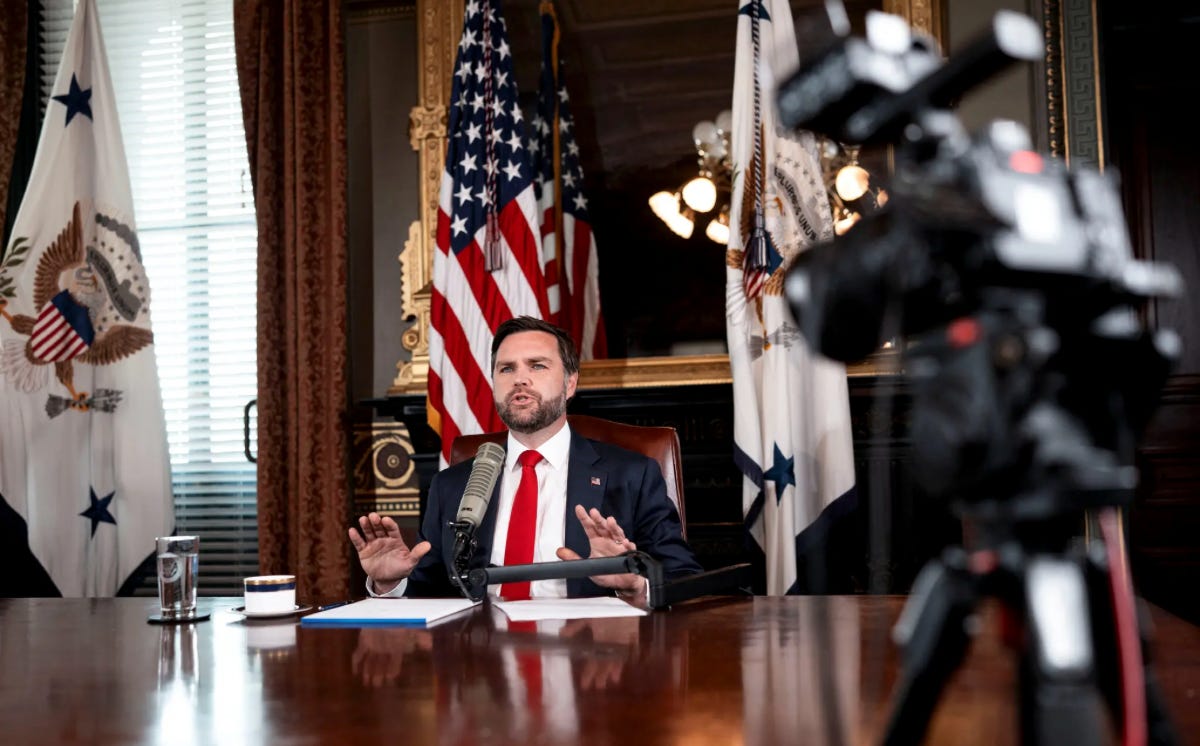Kirk’s Death Becomes Trump’s Weapon
Trump officials used Charlie Kirk’s podcast to unveil vague threats against the Left, reframing dissent as terrorism while ignoring America’s real epidemic of guns and political violence.
The assassination of Charlie Kirk has become less a moment of national mourning than a political weapon. Within days, top Trump administration officials appeared not in a press briefing or a congressional hearing, but on Kirk’s own podcast, where Vice President JD Vance played host from the White House. Alongside senior figures like Stephen Miller, they used the platform to lay out plans to treat left-wing activity as domestic terrorism — all before investigators had identified a clear motive in the case.
The optics were extraordinary. On government time, in official offices, senior leaders praised Kirk as a martyr to free speech while promising to “destroy this network” of supposed leftist agitators. Miller, invoking God, pledged the Justice Department and Homeland Security would root out a “domestic terror movement.” The promises were sweeping, the definitions vague, and the evidence nonexistent.
Meanwhile, Governor Spencer Cox in Utah insisted the suspect acted alone with a “leftist ideology.” Trump, for his part, excused right-wing radicals as motivated merely by “a desire to reduce crime,” even as he portrayed the Left as an organized cabal bent on destruction. In effect, Kirk’s death has been repurposed into a mandate for a crackdown — not on violence in general, but on Trump’s political opponents.
The Power at Play
What’s happening here is less about security than about narrative control. For decades, the American Right has cultivated language that frames dissent as disorder. Now, with Kirk’s killing, that language has been elevated into the machinery of the state. Broadcasting from the West Wing on a partisan podcast, officials blurred the line between governance and propaganda.
This is authoritarian stagecraft. To call ordinary nonprofit work or protest “terrorism” is to pre-emptively criminalize dissent. It also creates an excuse to marshal surveillance, prosecutions, and funding restrictions against institutions that check executive power — universities, civic groups, journalists, activists. The vagueness is the point: when “domestic terror” can mean anything, it can mean anyone.
At the same time, the administration minimizes right-wing violence. Trump’s assertion that conservative violence is really about fighting crime reframes political attacks as civic duty. This selective moral lens doesn’t lower the temperature; it legitimizes one form of violence while criminalizing the other.
Reframing the Debate
The conversation cannot be allowed to stay where Trump and Vance want it: “the Left” as a domestic terror movement. That framing collapses dissent into crime and makes authoritarian responses sound like national defense.
The real question isn’t which ideology breeds violence. The real question is: why do Americans, regardless of ideology, have such effortless access to guns such that any grievance can escalate into bloodshed?
Until that’s addressed, no crackdown on nonprofits or universities will change the fact that political violence is made possible by firearms, not funders.
Reframing this debate means calling out the bait-and-switch: from preventing violence to policing thought. As intelligence expert John Cohen warned, it is not the government’s job to control ideology. It is the government’s job to prevent violent acts. That means addressing gun access and disinformation — not criminalizing political opposition.
Building the Conversation
In everyday conversations, here’s how to keep the focus where it belongs:
Logical appeal: Point out that the investigation into Kirk’s killing isn’t complete. To criminalize the Left before facts are established is scapegoating, not security.
Emotional appeal: Stress that families across the country — left and right — want safety, not show trials. The way to honor Kirk’s life is not to widen the crosshairs to millions of ordinary Americans.
Ethical appeal: Remind others that democracy depends on free association and dissent. When government treats criticism with contempt, it erodes the very freedoms Kirk claimed to defend.
The Counterpoint Trap
“The Left is a domestic terror movement.” → Euphemistic Reframing
This redefines protest, nonprofit activity, or even criticism as terrorism.
Takeaway: Refocus on facts: investigators have not linked Kirk’s killing to a network. Guns, not nonprofits, are what make political violence deadly.
“Right-wing violence is different because it fights crime.” → Projection
Trump excuses his side’s violence by recasting it as civic duty.
Takeaway: Call out the double standard — violence is violence. Excusing one side guarantees more bloodshed.
“Critics of Kirk must be punished.” → Strawmanning
By conflating mockery or criticism with violence, officials distort dissent into something monstrous and then demand punishment for it.
Takeaway: Expose the distortion — words are not bullets. Guns, not speech, are what turn grievances into murder.
Deeper Dive
Timothy Snyder, On Tyranny – A guide to recognizing early authoritarian tactics like criminalizing dissent.
Naomi Klein, Shock Doctrine – On how crises are exploited to expand government power.
Everytown Research – Current data on how gun access, not ideology, drives America’s epidemic of political violence.



